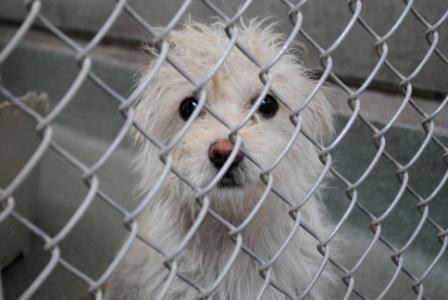Should I Adopt a Dog?
Information about dog adoption.

Animal Welfare impounds thousands of dog every year. We have written this to help you understand the ownership responsibilities of a companion dog, and to ensure your successful lifetime together. We encourage all potential pet owners to "Just Say Know." The best place to start is by getting a book about dogs and their requirements. It is much easier to take a book back, than a living, feeling pet.
Selecting the right dog for you and your lifestyle is very important. Dogs come in all shapes, sizes, coat lengths and type, color and temperament. The choice of selecting a puppy or an adult dog is yours alone; however, since three out of four prospective dog owners want a puppy, the problem of selecting and preparing for the new arrival usually means the arrival of a young puppy. There is nothing wrong with bringing home an adult dog. In fact, such a selection often has definite advantages. The adult dog more often is house trained and the rigorous feeding schedule necessary for the young puppy can be avoided.
Questions to Ask Yourself
- How big will this dog get? Will the little puppy grow so large that you are uncomfortable with him? Are you a "big" or "small" dog person? Will you be able to provide adequate room to fulfill his exercise needs?
- Will you be able to spend the necessary time to raise him properly or do you have other more pressing considerations? Do you have time to commit to obedience lessons? It's a fact that 96% of all dogs relinquished to the Animal Services Division have never had any obedience lessons. Their owners never had the time to learn basic communication skills for their companion.
- If you select a puppy whose adult coat will be long and flowing, will you have time to brush him daily?
- Will his temperament suit your needs? Ask about adult size and appearance. Ask about his temperament. When studying a prospective dog, look for signs of withdrawal from people as well as signs of being "too pushy." Watch for signs of aggression. If you want a calm, stable dog, look for an easygoing animal. If you want an outgoing dog, look for an adventurous animal. Observe reactions to you and your family. Some breeds do not make good family dogs and are not good choices for anyone with children. Animal Welfare Department Adoption Counselors will be able to help with these choices.
Commitments
You should ask yourself if you can make financial and emotional commitments to:
- Lifetime of the dog which may range from 7-15 years
- House training and crate training
- Possible destructive behaviors and seeking help for them
- Obedience training
- Regular veterinary care including dental care and vaccinations
- Chew toys and play toys
- Your pet's own bed or insulated dog house
- Leashes, collars, training accessories, ID tags or microchip identification
- A book about dogs and dog training issues
Tips
Oftentimes a dog will pick you. Trust your eyes and your hands to tell if an animal is sound in body. His eyes and ears should not have suspicious discharges or odors. Legs should have strong bones. Bodies should have solid muscles. Lift the hair to see if the coat is free of scales and parasites. Animal Welfare Department pets sometimes have ticks, which can be treated with supplies found at the local pet supply store, or your veterinarian's office.
Prepare for your pet's arrival before you bring it home. Allow yourself ample time to properly begin your dog's life with you. Is your backyard fenced? A dog loose on the streets is asking to be run over by a car, be poisoned, or cause problems with your neighbors. Is ample food and water available? If you plan to leave the dog in the backyard while you are at work, he will need a dog house to protect him from the weather.
The dog's first night is likely to be disturbing to the family. Keep in mind that this may be the first time he has been away from his mother, brothers, and sisters, and that he may be confused and frightened. Every dog likes to have a place that is only his. He holds nothing more sacred than his own bed. If you get your dog a bed, locate it away from the drafts and/or radiators and heaters. If you have a special room for his bed, be sure there is nothing there with which he can harm himself. If left in a room by himself, he may howl, cry all night, while being next to you might reassure and quiet him. It may be wise to put a loud ticking alarm clock in the room with him, or wrapped in one of your shirts next to him. The ticking makes comforting noises and oftentimes reminds the puppy of his mother's heartbeat. Wrapping the clock in one of your shirts teaches the puppy to bond with you more quickly.
